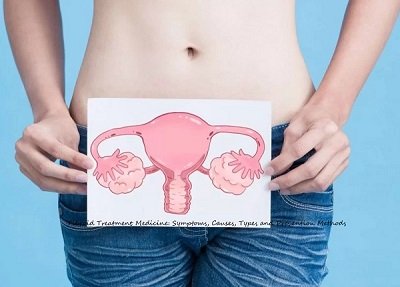
Uterine fibroids (leiomyomas or myomas), are noncancerous growths that develop in or around the uterus.
Fibroids are very common, affecting an estimated 80% of women by the age of 50. Fibroids are usually benign, meaning they will not spread to other parts of the body.
Symptoms of fibroids: |
The symptoms of fibroids can vary depending on the size, number, and location of the fibroids. Many women with fibroids do not experience any symptoms at all and only discover they have fibroids during a routine pelvic exam or pregnancy ultrasound.
However, fibroids can sometimes cause a variety of symptoms, including:
⦁ Heavy menstrual bleeding or painful periods: This can lead to anemia, meaning a low level of red blood cells. The most common symptom of fibroids. Fibroids can cause the uterus to expand, which can lead to more blood loss during menstruation. |
⦁ Longer or more frequent periods: Some people may bleed for more than seven days or have spotting between periods.
⦁ Pelvic pressure or pain: Fibroids can grow large enough to put pressure on nearby organs, such as the bladder, bowel, or ovaries, and cause discomfort or cramping.
⦁ Frequent urination or trouble urinating: Fibroids can press on the bladder, making it difficult to empty completely and also block the urine flow or make the bladder feel full even when it’s not. |
⦁ Growing stomach area: Fibroids can enlarge the uterus and make it look like a pregnancy.
⦁ Constipation: Fibroids can compress the rectum and make it hard to pass stool.
⦁ Pain in the stomach area or lower back, or pain during sex: Fibroids can irritate the nerves and muscles in the pelvic region and cause pain or discomfort.
What causes Fibroids? The exact cause of fibroids is unknown, but they may be influenced by hormones, family history, and other health conditions. There are four main types of fibroids, based on where they grow and the shape they take: |
⦁ Subserosal fibroids grow on the outside of the uterus. They are the most common type of fibroid. They can cause bloating, pelvic pain, lower back pain, constipation, and frequent urination. Some subserosal fibroids grow on a stalk, called pedunculated subserosal fibroids, which can twist and cause sharp pain.
⦁ Intramural fibroids grow within the muscular wall of the uterus. They are the second most common type of fibroid. They can cause heavy or prolonged periods, pelvic pressure, and difficulty getting pregnant. They can also enlarge the uterus and make it look like a pregnancy.
⦁ Submucosal fibroids grow into the open space inside the uterus. They are the rarest and most problematic type of fibroid. They can cause very heavy or painful periods, bleeding between periods, anemia, and infertility. They can also interfere with the implantation of an embryo or the growth of a fetus. |
⦁ Pedunculated submucosal fibroids grow on a stalk inside the uterus. They can cause the same symptoms as submucosal fibroids, as well as cramping and bleeding. They can also twist and cause severe pain or bleeding.
What is the best treatment medication to shrink fibroids without surgery? |
Millions of women worldwide endure the discomfort and distress of fibroid. While fibroids often resolve on their own, for many women, they persist, significantly impacting their quality of life.
If you're among the many women seeking relief from fibroids, you're not alone.
Today, we got you a pack of effective treatment supplements available to help manage symptoms, shrink fibroids, and improve your overall well-being without surgery or operation.
If you have fibroids, remember surgery is not your best or only solution, because surgery handles the effects, not the root cause, that's why fibroids grow multiple times after they have been surgically removed. |
We are advocates for the shrinking and eventual removal of the fibroids naturally with our natural supplements, which shrink the fibroids to the root cause and get your hormones back into a balanced state. Click here for more.
Potential prevention methods for fibroids: |
While there is no definitive way to prevent fibroids, certain lifestyle factors may help reduce the risk of developing them or slow their growth.
These prevention methods are not guaranteed to work for everyone, and they may not be enough to treat severe or symptomatic fibroids.
⦁ Exercise regularly: Studies have shown that people who exercise regularly are less likely to develop fibroids. Exercise may also help regulate your hormones, improve blood circulation, reduce stress, and maintain a healthy weight. |
⦁ Manage your weight: Obesity is associated with an increased risk of fibroids. Being overweight or obese increases your risk of developing fibroids, as it may raise your levels of estrogen and progesterone, hormones that stimulate fibroid growth. Losing weight may help shrink or prevent fibroids.
⦁ Regular pelvic exams: Regular pelvic exams allow your doctor to monitor your fibroids and detect any changes early on.
⦁ Drink green tea or use green tea extract: Green tea contains antioxidants and anti-inflammatory properties that inhibit fibroid growth. Research has shown that green tea or its extract help prevent or shrink fibroids in rats and humans. |
⦁ Choose your birth control method wisely: Some hormonal contraceptives, such as birth control pills, may decrease your risk of developing fibroids by regulating your menstrual cycle and preventing extreme fluctuations in hormone levels.
However, other hormonal contraceptives, such as injections or implants, may increase your risk of developing fibroids by providing a constant supply of progestin, a synthetic form of progesterone.
Nonhormonal contraceptives, such as copper IUDs, may not affect your fibroid risk, but they may worsen your bleeding or cramping symptoms. Talk to your doctor about the best birth control option for you.
⦁ Consider vitamin D supplementation: Studies suggest that vitamin D deficiency may be linked to an increased risk of fibroids. Talk to your doctor about whether vitamin D supplements are right for you. ⦁ Vitamin E and Vitamin C rich food: Antioxidant-rich foods like vitamin E and C may help protect against fibroid growth. |
⦁ Eat a balanced diet: Eating a diet rich in fruits, vegetables, whole grains, and lean proteins help prevent or reduce fibroids by providing antioxidants, anti-inflammatory nutrients, and fiber.
Avoid or limit foods that may increase inflammation or hormone levels, such as red meat, processed foods, alcohol, and caffeine.
Red meat contains high levels of estrogen, a hormone that may stimulate fibroid growth.















